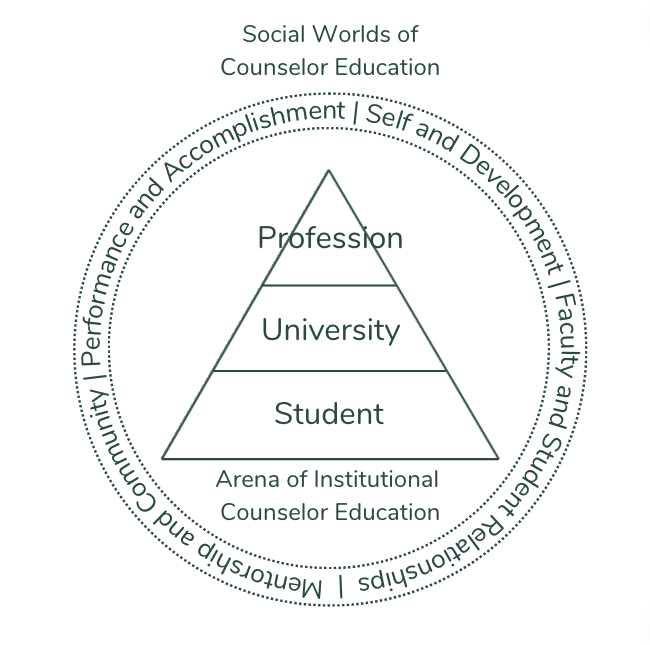World View, Commitment, Professional Focus
World view
Informed by post-structuralist philosophy, my teaching ethos embraces intersubjectivity as a fundamental principle, recognizing the fluidity and plurality of meaning in the learning process. Within this framework, I view teaching as a collaborative endeavor where knowledge is not fixed but continually negotiated and redefined through dialogue, reflexivity, and deconstruction of power dynamics. I strive to create a learning environment that encourages critical inquiry, challenges dominant narratives, and empowers students to explore diverse perspectives and question established norms. By embracing the complexities of subjectivity and language, I aim to foster a space of radical openness and intellectual curiosity, where students and I co-create knowledge that is both dynamic and transformative.
Commitment
I began my professional training at Drury University where I double majored in clinical neuroscience and sociology, intending to become a researcher focused on human development and cultural anthropology. However, my desire to be useful and get involved in the therapy room led me to pursue a masters of science in clinical mental health counseling.
Early on in my academic preparation, I began to put together my understanding of knowledge, organically centered around post-structural philosophy. Post-structuralism is a philosophical worldview that for me, embraces the fluidity and multiplicity of meanings in language and culture. From this posture, I challenge where appropriate and important, the definitive interpretations of our culture's power dynamics and entrenched hierarchies, recognizing that knowledge and identity are constructed and ever-changing. I engage with written and experienced phenomena critically, seeking to unravel their layers of meaning and motivation, questioning the stability of structures often taken for granted. Above all else, I value interpretive flexibility and sensitivity, and embrace the inherent and ever present uncertainty of understanding in our complex and interconnected world.
I've spent my entire professional career in the professional counseling area of case conceptualization training and professional identity development, seeking to apply my post-structuralist research agenda and abilities to help counselors and therapists grow toward their own authentic and embodied professional identity, to best support themselves and those they work with.
Professional Focus
Throughout my academic career, I have honed my professional focus to intentionally shape knowledge creation culture in counselor education and supervision. Seeking to directly engage and push the growth edge of the arena of institutional counselor education, I am committed to student development, university advocacy, and the trajectory of our professionalization and identity development.
Pressured to conform: The Qualitative paradigm in counselor education and supervision
Using Charmaz’s (2014) grounded theory (GT) and Clarke’s (2003; 2005; Clarke et al., 2018) situational analysis (SA), this study explores the experience of counselor educators and their pressure to conform throughout their professional identity development process. As counselor educators, these individuals are thought and practice leaders in the field of professional counseling, training up future counselors and advancing the field in scholarship and advocacy as a social science (Aubrey, 1977; 1983; Hansen et al., 2014). As a social science, the integrity and investigative power of counseling are tethered to empirical discovery through quantitative and qualitative methods and philosophy – while inherently complementary, these two modes of inquiry, and their respective philosophies, have been set at odds in the course of development within the social sciences. This tension has been referred to as the “paradigmatic pendulum” (Hansen, 2009), wherein the social sciences swing back and forth throughout the eras from “medicalized, material models of care to psychological, immaterial approach to human change” (Hansen et al., 2014, p. 117). Representing the core of our profession, the swinging of this pendulum often goes undiscussed by counselor educators, and thus without understanding of its implications on professional identity in counselor education. Interpreted through conflict theory and post-structuralism, the participants were guided through three iterative interviews to uncover the meaning they find in the qualitative world of discovery, and their place in it, as they embody their own understanding of professional identity in counselor education.
references
Aubrey, R. F. (1977). Historical development of guidance and counseling and implications for the future. The Personnel and Guidance Journal, 55(6), 288-295. https://doi.org/10.1002/j.2164-4918.1977.tb04991.x
Aubrey, R. F. (1983). The odyssey of counseling and images of the future. Personnel & Guidance Journal, 62(2), 78-82. https://doi.org/10.1111/j.2164-4918.1983.tb00151.x
Charmaz, K. (2014). Constructing grounded theory. SAGE.
Clarke, A. (2005). Situational analysis: Grounded theory after the postmodern turn. SAGE.
Clarke, A. (2003). Situational analyses: Grounded theory mapping after the postmodern turn. Symbolic Interaction, 26(4), 553-576. https://doi.org/10.1525/si.2003.26.4.553
Clarke, A., Friese, C., & Washburn, R. S. (2018). Situational analysis: Grounded theory after the interpretive turn (2nd ed.). SAGE.
Hansen, J. T. (2009). On displaced humanists: Counselor education and the meaning-reduction pendulum. Journal of Humanistic Counseling, Education and Development, 48(1), 65-76. https://doi.org/10.1002/j.2161-1939.2009.tb00068.x
Hansen, J. T., Speciale, M., & Lemberger, M. E. (2014). Humanism: The foundation and future of professional counseling. Journal of Humanistic Counseling, 53(3), 170-190. https://doi.org/10.1002/j.2161-1939.2014.00055.x


